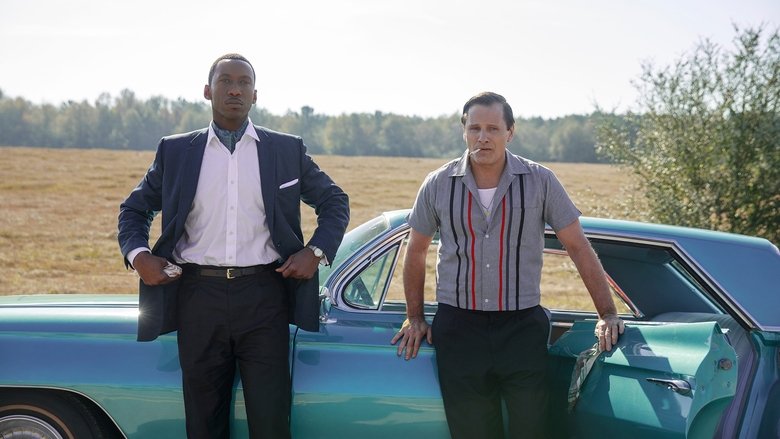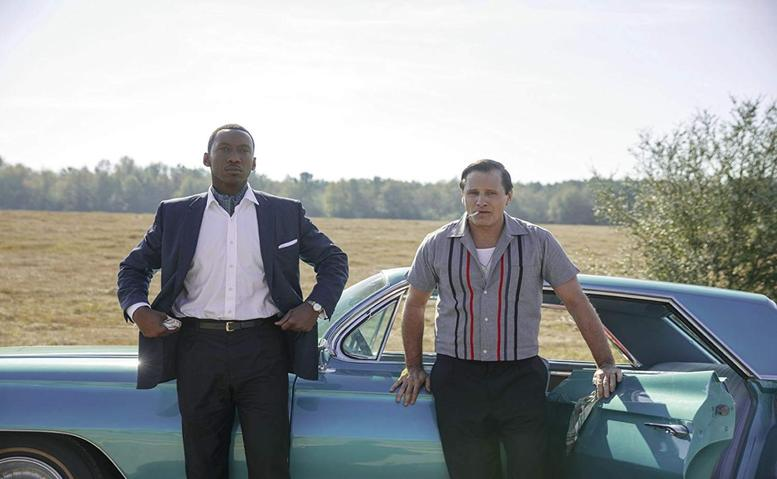← Back to Reviews

in

Green Book (2018)
It’s a sure fire indication of a weak field when a shaky film such as Green Book finds itself in serious consideration within a number of Academy Award top categories. Hollywood has put excellence in story telling on the back burner for the past few years in favor of promoting its own fashionable social causes. Now, just in case there are folks who haven’t been to a movie since 1960, the writers of Green Book endeavor to show us that there was deep racial prejudice against blacks in the U.S., most especially in the South.
The story creates an account of one of America’s premier pianists named Don Shirley, a black man, who embarked on a year-plus concert tour in 1962, of which many dates were in the South. Because of racist violence against Nat King Cole at a concert in Alabama in 1960, Shirley hired Tony “Lip” Vallelonga --a mob friendly Italian who worked at Manhattan’s Copacabana night club-- to be his driver and bodyguard.
Beyond these basic facts the story is completely fictionalized. To their credit, the producers announced in the opening credits that the film was “inspired by a true story”. “Inspired by” means that the Shirley/Vallelonga tour gave them an idea for a story. Unfortunately in the film version, the tour was shrunk to two months, and was made to end just before Christmas so that Tony could return home to be with his family, and to set up a dramatic ending. In Hollywood fashion Tony and Don soon became buds, yet in true life Shirley’s brother stated that Don never considered Tony a friend, but only an employee who he required to wear a chauffer’s uniform and a cap. And there are no reports of racial incidents on the tour. Presumably the pair did make use of the “The Negro Motorist Green-Book” (actual title) in selecting their safe accommodations.
This is certainly not the first time Hollywood has made up an entire story based on an actual event, and in fact there probably have been more fictionalized movie accounts than not. But while watching the film the question kept coming up: what was this film’s point of view? And whose story were they trying to portray? Certainly they were going for both entertainment and social justice value; but after the many dozens of movies dealing with black/white racial issues over the past 60 years, the back story of the Jim Crow South was not a shocker.
At least since 1958, with The Defiant Ones, then Patch of Blue, Guess Who’s Coming to Dinner, on through Driving Miss Daisy, even Forrest Gump, along with scores of others since, have thoroughly explored and displayed the subject of prejudice against mixed race pairings, and in prejudice in general. Yet in Green Book we are treated to the corniest scenes of southern boobs dishing out the rankest forms of racial derision in such hackneyed form that it bordered on satire. One half expected to see Sheriff Buford T. Justice appear.
If the film’s title and subject matter were any indication that the focus was on Don Shirley, his beliefs, and his quest to endure a music tour of the South, then it came as a surprise that the thrust of the story put most of the emphasis on Tony Lip: his background, his actions, his philosophy, his awakening. Reportedly this was not lost on Shirley’s relatives, who resented the depiction of their family relationships, along with the emphasis put on Tony Lip.
The chief disappointment in the film was the writing. Director Peter Farrelly is known for wacky comedies, and this was his first foray into drama. He participated in the scripting with a sophomore writer, Brian Currie, along with Tony Vallelongas’s son Nick. Tony Lip’s part was the better of the two in construction, and Viggo Mortensen brought in an award winning quality performance. There must have been indecision about scripting Don Shirley’s part. In an attempt to give the character too many facets, the result was a personality who was all over the map, which must have made it a difficult continuity project for the actor. In his defense Mahershala Ali stated that he’d liked to have met with Shirley’s family in order to provide a more nuanced character. Still, what he did well, he did really well. Of particular note was his portrayal of piano playing. He’d worked with composer Kris Bowers until he really appeared to be playing the difficult piano pieces.
Despite its anachronistic nature, heftier writers with a different approach could have made this story into a more interesting film.
Doc’s rating: 5/10
Green Book (2018)
It’s a sure fire indication of a weak field when a shaky film such as Green Book finds itself in serious consideration within a number of Academy Award top categories. Hollywood has put excellence in story telling on the back burner for the past few years in favor of promoting its own fashionable social causes. Now, just in case there are folks who haven’t been to a movie since 1960, the writers of Green Book endeavor to show us that there was deep racial prejudice against blacks in the U.S., most especially in the South.
The story creates an account of one of America’s premier pianists named Don Shirley, a black man, who embarked on a year-plus concert tour in 1962, of which many dates were in the South. Because of racist violence against Nat King Cole at a concert in Alabama in 1960, Shirley hired Tony “Lip” Vallelonga --a mob friendly Italian who worked at Manhattan’s Copacabana night club-- to be his driver and bodyguard.
Beyond these basic facts the story is completely fictionalized. To their credit, the producers announced in the opening credits that the film was “inspired by a true story”. “Inspired by” means that the Shirley/Vallelonga tour gave them an idea for a story. Unfortunately in the film version, the tour was shrunk to two months, and was made to end just before Christmas so that Tony could return home to be with his family, and to set up a dramatic ending. In Hollywood fashion Tony and Don soon became buds, yet in true life Shirley’s brother stated that Don never considered Tony a friend, but only an employee who he required to wear a chauffer’s uniform and a cap. And there are no reports of racial incidents on the tour. Presumably the pair did make use of the “The Negro Motorist Green-Book” (actual title) in selecting their safe accommodations.
This is certainly not the first time Hollywood has made up an entire story based on an actual event, and in fact there probably have been more fictionalized movie accounts than not. But while watching the film the question kept coming up: what was this film’s point of view? And whose story were they trying to portray? Certainly they were going for both entertainment and social justice value; but after the many dozens of movies dealing with black/white racial issues over the past 60 years, the back story of the Jim Crow South was not a shocker.
At least since 1958, with The Defiant Ones, then Patch of Blue, Guess Who’s Coming to Dinner, on through Driving Miss Daisy, even Forrest Gump, along with scores of others since, have thoroughly explored and displayed the subject of prejudice against mixed race pairings, and in prejudice in general. Yet in Green Book we are treated to the corniest scenes of southern boobs dishing out the rankest forms of racial derision in such hackneyed form that it bordered on satire. One half expected to see Sheriff Buford T. Justice appear.
If the film’s title and subject matter were any indication that the focus was on Don Shirley, his beliefs, and his quest to endure a music tour of the South, then it came as a surprise that the thrust of the story put most of the emphasis on Tony Lip: his background, his actions, his philosophy, his awakening. Reportedly this was not lost on Shirley’s relatives, who resented the depiction of their family relationships, along with the emphasis put on Tony Lip.
The chief disappointment in the film was the writing. Director Peter Farrelly is known for wacky comedies, and this was his first foray into drama. He participated in the scripting with a sophomore writer, Brian Currie, along with Tony Vallelongas’s son Nick. Tony Lip’s part was the better of the two in construction, and Viggo Mortensen brought in an award winning quality performance. There must have been indecision about scripting Don Shirley’s part. In an attempt to give the character too many facets, the result was a personality who was all over the map, which must have made it a difficult continuity project for the actor. In his defense Mahershala Ali stated that he’d liked to have met with Shirley’s family in order to provide a more nuanced character. Still, what he did well, he did really well. Of particular note was his portrayal of piano playing. He’d worked with composer Kris Bowers until he really appeared to be playing the difficult piano pieces.
Despite its anachronistic nature, heftier writers with a different approach could have made this story into a more interesting film.
Doc’s rating: 5/10
